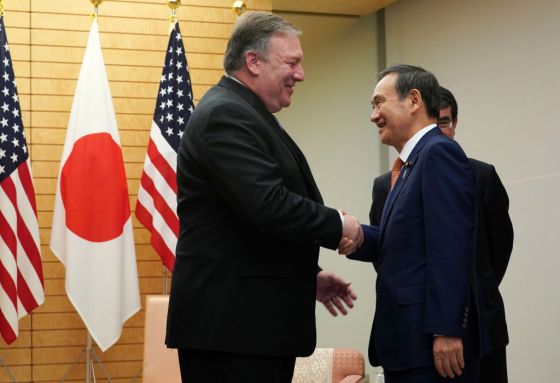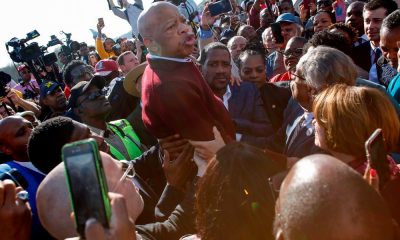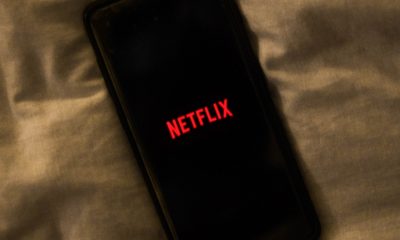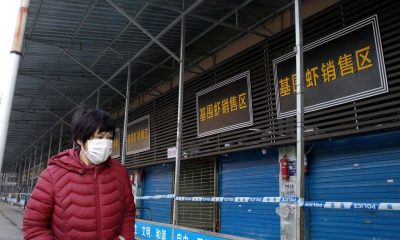World News
Protests Erupt as Russia Seeks Closer Ties With Belarus
(MINSK, Belarus) — The leaders of Russia and Belarus spent more than five hours Saturday in sensitive talks on deepening ties between the two allies — a meeting that triggered a protest in the Belarusian capital among those who fear Russia’s intentions.
No immediate deal was announced after the talks in Sochi on Russia’s Black Sea coast between Russian President Vladimir Putin and Belarusian President Alexander Lukashenko, but a senior Russian official said they edged closer to an agreement.
More than 1,000 opposition demonstrators rallied in Minsk to protest closer integration with Russia, which they fear could erode the post-Soviet independence of Belarus, a nation of 10 million. The protesters marched across the Belarusian capital, chanting “No to integration!” and “Belarus to Europe!”
Lukashenko, who has ruled Belarus with an iron fist for more than a quarter-century, relies on cheap Russian energy and loans to maintain his country’s Soviet-style economy.
Russia and Belarus signed a union agreement in 1997 that envisaged close political, economic and military ties, but stopped short of forming a single nation.
The Kremlin has recently cranked up the pressure on Belarus, raising energy prices and cutting subsidies. Russian officials say Minsk should accept closer economic integration if it wants to benefit from lower energy prices.
Speaking at the start of talks in Sochi, Lukashenko urged Putin to continue sending fuel shipments to Belarus at Russia’s domestic prices.
“We just want equal conditions — nothing else,” Lukashenko said with a wry smile as he faced Putin across the table.
“We shall talk about future prospects. It’s a landmark meeting,” Putin said. “I hope we will keep doing all we can to make our peoples and nations feel close and keep moving primarily in the economic sphere, but also in the social field, to benefit from that integration.”
Russian Economics Minister Maxim Oreshkin said the two sides narrowed their positions on oil, gas and other disputed issues and the leaders instructed officials to continue to iron out the remaining differences. Putin and Lukashenko are to meet again on Dec. 20 in St. Petersburg.
Some in Belarus fear the new agreements could pave the way for a full merger of the two countries, concerns fueled by Russia’s 2014 annexation of Ukraine’s Crimean Peninsula.
There also has been speculation that Putin, who has been in power for nearly two decades, could contemplate a merger with Belarus as a way to stay at the helm of the new union state of Russia and Belarus after his current Russian presidential term expires in 2024.
“The Kremlin no longer wants to pay for rhetoric and is starting to demand political concessions from Minsk ahead of 2024, in a hint at the new state and the new job for Putin,” said Valery Karbalevich, an independent Minsk-based political analyst.
Putin has been coy about his future plans.
Lukashenko has bristled at the Russian pressure, charging that some Russian officials want to push Belarus into weakening its sovereignty. The Belarusian leader has vowed not to surrender Belarus’ post-Soviet independence but the opposition in Belarus has remained nervous.
“Politicians are playing with Belarusian sovereignty like in a card game, and we will keep protesting as long as a threat to our independence remains,” said Pavel Severinets, the organizer of Saturday’s rally.
The protest wasn’t sanctioned by the authorities, but police allowed the demonstrators to march across downtown Minsk.
“They are again trying to pull us back into that rotten empire that is trying to revive itself at the expense of neighbors,” said 19-year-old student Mikhail Olshansky, who covered his face with Belarus’ pre-Lukashenko red-and-white flag.
Lukashenko has shown little tolerance for dissent, earning him the nickname of Europe’s last dictator, but he has increasingly sought to reach out to the West as he faces pressure from Russia.
The U.S. and the European Union have repeatedly criticized Belarusian authorities for flawed elections and crackdowns on the opposition, but they have lifted some their sanctions in recent years as Belarus freed political prisoners.
“Minsk is playing a simple game, trying to win advantages for its Soviet-style economy by threatening to break the union with Russia and get closer to the West,” Karbalevich said. “That is the reason why repressions against the opposition were put on standby. Lukashenko doesn’t want to wake up one day as a provincial governor in Russia.”
___
Isachenkov reported from Moscow.
World News
Yoshihide Suga Is Japan’s New Prime Minister. Here’s What That Means for the U.S.
As Japan’s new prime minister, Yoshihide Suga, takes the reins of the world’s third-largest economy this week, he inherits a domestic agenda swamped by the coronavirus pandemic, the country’s biggest economic slump on record and the postponed Tokyo Olympics.
The leader of one of America’s closest allies also steps into a tense geopolitical climate amid rapidly deteriorating U.S.-China relations. Yet experts say this new premier is largely untested in the foreign policy arena.
“Suga is more domestically-oriented and several questions have been raised about his propensity to deal with foreign relations and international issues,” says Donna Weeks, professor of political science at Musashino University in Tokyo.
Suga takes over from the country’s longest-serving prime minister, 65-year-old Shinzo Abe, who resigned due to health reasons.
Abe, who became an internationally recognizable statesman during his second tenure as prime minister, made wooing President Donald Trump a top priority. He was the first foreign leader to meet Trump after the 2016 election, and invited Trump to be the first foreign leader to meet Japan’s new emperor in 2019.
During Trump’s 2019 visit to Japan, Abe’s pandering made headlines. They played a round of golf (stopping to take a smiling selfie in between holes), ate a hamburger lunch, sat at ringside seats at a sumo competition and then tucked into a Japanese barbecue dinner.
When Abe announced in late August that he was stepping down, Trump was quick to comment on Twitter. He called Abe “the greatest Prime Minister in the history of Japan,” adding that Japan’s “relationship with the USA is the best it has ever been.”
That begs the question: what will a new prime minister mean for U.S.-Japan relations?
A shift from personal politics
Trump’s foreign policy has often been defined by his personal relationships with world leaders, and Abe appears to have fostered among the closest ties to the volatile American President.
Suga, Abe’s longtime chief cabinet secretary, is largely expected to follow in his predecessor’s footsteps when it comes to foreign policy. But he may not be able to replicate the Trump-Abe bromance, not least because he admits he lacks the diplomatic skills.
“Prime Minister Abe’s leadership diplomacy was truly amazing. I don’t think I can match that,” Suga said on Sept. 12, adding that he will continue to consult with Abe on foreign relations.
Still, Suga’s role as Abe’s right-hand man for the last eight years means he has a strong understanding of how to manage the relationship with the U.S., says Yoshikazu Kato, an adjunct associate professor at the University of Hong Kong’s Asia Global Institute.
The White House said in a statement that Trump “looks forward to working with Prime Minister Suga to make [relations] even stronger.”
“Suga is less outgoing than Abe, but he knows what he has to do—at least until November,” Michael J. Green, senior vice president for Asia and the Japan Chair at the Washington D.C-based think-tank the Center for Strategic and International Studies (CSIS), tells TIME. “One of [Suga’s] most important jobs for the near term will be managing the constant insults and unpredictability of President Trump.”
The benefits of Abe’s U.S. charm offensive are also up for debate. Trump still imposed aluminum and steel tariffs on Japan, strong-armed Abe into a one-sided trade deal and proposed to quadruple the $2 billion Japan pays for hosting U.S. troops in the country. And Trump withdrew the U.S. from the Trans-Pacific Partnership, a big regional trade deal that Japan had promoted as a way of containing China’s growing influence.
Still, Suga is not a completely unknown quantity in Washington, and has already built relationships with some top U.S. officials. He met U.S. Secretary of State Mike Pompeo in Tokyo in 2018, and visited Washington D.C. last May, meeting Vice President Mike Pence (at the time, Suga’s visit sparked speculation that he was being groomed for a bigger role).
Experts say Suga will be closely watching the U.S. election to determine what a Biden presidency might mean for Japan.
“Japan is greatly interested in the U.S. election because Mr. Biden’s direction toward China affects Japan greatly,” says Mieko Nakabayashi, a professor at Waseda University in Tokyo. “Japan wants the U.S. to deter China’s military aggression in Asia.”

Read More: Yoshihide Suga Will Succeed Shinzo Abe as Prime Minister. What’s Next for Japan?
Domestic problems may take precedence over foreign policy
At the outset, the new prime minister may be occupied by trouble at home. The 71-year-old inherits an economy battered by COVID-19, which he will have to attempt to resuscitate despite a shrinking and aging population. He will also have to determine the fate of the postponed Tokyo Olympics.
He said on Sept. 11 that his top priorities will be fighting the virus and turning around the economy.
“I think Suga will focus on COVID-19 first and foremost,” says Weeks, of Musashino University.
Abe faced public scrutiny for his handling of the virus. Although Japan’s response has been more effective than many other nations, many in Japan perceived the national government’s response as too slow. As of Sept. 17, about 1,480 people have died and 77,000 have been infected in Japan.
Read More: Donald Trump Didn’t Notice When Shinzo Abe Took a Tumble on the Golf Course
A balancing act
Even while juggling a busy domestic agenda, Suga will still have to do a balancing act between the U.S. and China, one made no easier by particularly fraught relations between the superpowers.
Jeff Kingston, Director of Asian Studies at Temple University’s Tokyo campus, tells TIME that Suga will prioritize U.S. relations, but he will also seek to maintain the thaw in relations with China. Economic ties between Japan and China had improved under Abe, but historic tensions remain and Chinese incursions into Japanese waters around the disputed Senkaku Islands (known as the Diaoyu Islands in China) have caused agitation.
China expects to deepen cooperation on fighting COVID-19 and to grow economic ties, according to foreign ministry spokesperson Wang Wenbin.
An editorial in late August in the Global Times, a state-run mouthpiece for the Chinese Communist Party, called for closer partnership with Japan amid tense relations with the U.S. “China must win the support of countries like Japan” as it is “faced with strategic containment from the U.S,” it said.
Suga has also said that he wants to resolve some unfinished business on the diplomatic front. Abe had failed in his goal to resolve several wartime legacies, including normalizing ties with North Korea and signing a peace treaty with Russia to formally end their hostilities in World War II.
In early September, Suga told a news conference that he would consider meeting North Korean Leader Kim Jong-Un without preconditions. He said that he wants to “make a breakthrough” on the issue of the abduction of Japanese nationals by Pyongyang in the 1970s and 1980s, a goal that Abe said he regretted not achieving.
As far as North Korea diplomacy on nuclear issues goes, it will be important for Japan to continue working closely with the U.S., says Nakabayashi of Waseda University.
Even as some in Japan worry about the rare uncertainty this new administration brings, experts say the U.S.-Japan alliance is likely to remain stable under Suga.
“If he follows Abe, and that seems likely, he will seek a better economic relationship with China despite differences on security, territory and history and do whatever it takes to keep Uncle Sam engaged to provide security,” says Kingston of Temple University. About 54,000 U.S. troops are deployed in Japan, and the country hosts the U.S. Navy’s Seventh Fleet. Japan’s post-World War II “pacifist” constitution renounced war, and Abe left office without fulfilling long cherished plans to alter the charter.
Plus, says Kristi Govella, an assistant professor of Asian Studies at the University of Hawaii at Mānoa, the foundations of the U.S.-Japan alliance run much deeper than ties between individual leaders.
“The U.S. and Japan share significant interests and values that give them strong incentives to maintain good relations with each other, and this is unlikely to change under a Suga administration,” she says. “Japan is a key U.S. partner in dealing with China and North Korea and maintaining stability in the region more broadly.”
World News
‘Steady drumbeat of misinformation’: FBI chief warns of Russian interference in US elections
* Chris Wray says bureau has seen ‘very active efforts by Russians’ * Efforts are primarily meant to denigrate Joe BidenChristopher Wray, the FBI director, on Thursday warned that Russia is interfering in the 2020 US presidential elections with a steady stream of misinformation aimed at undermining Democrat Joe Biden as well as sapping Americans’ confidence in the election process.Moscow is also attempting to undercut what it sees as an anti-Russian US establishment, Wray told the Democratic-led House of Representatives’ homeland security committee in a hearing on Capitol Hill.He said his biggest concern was a “steady drumbeat of misinformation” that he said he feared could undermine confidence in the result of the 2020 election.Wray repeatedly addressed election meddling in his testimony to the House committee, saying the bureau is committed to blocking such interference efforts in this year’s elections.He specifically said the bureau has witnessed “very active efforts by the Russians to influence our election in 2020”.Russian agents, Wray said, were mainly trying to affect the election through “malign foreign influence”, such as social media, state media and the use of proxies.He noted the Russians’ efforts were meant “primarily to denigrate vice-president Biden and what the Russians see as kind of an anti-Russian establishment”.Wray’s testimony follows a 7 August warning by the director of the National Counterintelligence and Security Center that Russia, China and Iran were all trying to interfere in the 3 November election.Multiple reviews by US intelligence agencies have concluded that Russia acted to boost Donald Trump’s 2016 campaign and damage his Democratic rival, Hillary Clinton. The Republican president has long bristled at that finding, which Russia officially denies despite special counsel Robert Mueller indicting Russian operatives for meddling in order to help Trump.Trump himself has repeatedly and without evidence questioned the increased use of mail-in ballots, a long established method of voting in the United States which are expected to see a surge in use this election cycle because of the risks of the coronavirus. On Thursday Trump wrote on Twitter, without evidence, that they could make it impossible to know the election’s true outcome.After a series of wild tweets about election chaos, Twitter slapped a label on one of the president’s tweets about voting by mail, which the president has falsely claimed is particularly vulnerable to voter fraud.On China, Wray said that the FBI is so active in monitoring Chinese efforts to acquire US technology and other sensitive information that it is opening a new counterintelligence investigation related to China “every 10 hours”.Wray said the FBI is conducting multiple investigations into violent domestic extremists. He said the largest “chunk” of investigations were into white supremacist groups.The director took a question about threats of domestic terrorism, specifically about anti fascist radical activists known collectively as Antifa, which the president has repeatedly denigrated.Wray emphasized that the FBI did not view threats in terms of liberal or conservative politics. “We’re focused on the violence, not the ideology,” he said.
World News
Yoshihide Suga Is Japan’s New Prime Minister. Here’s What That Means for the U.S.
As Japan’s new prime minister, Yoshihide Suga, takes the reins of the world’s third-largest economy this week, he inherits a domestic agenda swamped by the coronavirus pandemic, the country’s biggest economic slump on record and the postponed Tokyo Olympics.
The leader of one of America’s closest allies also steps into a tense geopolitical climate amid rapidly deteriorating U.S.-China relations. Yet experts say this new premier is largely untested in the foreign policy arena.
“Suga is more domestically-oriented and several questions have been raised about his propensity to deal with foreign relations and international issues,” says Donna Weeks, professor of political science at Musashino University in Tokyo.
Suga takes over from the country’s longest-serving prime minister, 65-year-old Shinzo Abe, who resigned due to health reasons.
Abe, who became an internationally recognizable statesman during his second tenure as prime minister, made wooing President Donald Trump a top priority. He was the first foreign leader to meet Trump after the 2016 election, and invited Trump to be the first foreign leader to meet Japan’s new emperor in 2019.
During Trump’s 2019 visit to Japan, Abe’s pandering made headlines. They played a round of golf (stopping to take a smiling selfie in between holes), ate a hamburger lunch, sat at ringside seats at a sumo competition and then tucked into a Japanese barbecue dinner.
When Abe announced in late August that he was stepping down, Trump was quick to comment on Twitter. He called Abe “the greatest Prime Minister in the history of Japan,” adding that Japan’s “relationship with the USA is the best it has ever been.”
That begs the question: what will a new prime minister mean for U.S.-Japan relations?
A shift from personal politics
Trump’s foreign policy has often been defined by his personal relationships with world leaders, and Abe appears to have fostered among the closest ties to the volatile American President.
Suga, Abe’s longtime chief cabinet secretary, is largely expected to follow in his predecessor’s footsteps when it comes to foreign policy. But he may not be able to replicate the Trump-Abe bromance, not least because he admits he lacks the diplomatic skills.
“Prime Minister Abe’s leadership diplomacy was truly amazing. I don’t think I can match that,” Suga said on Sept. 12, adding that he will continue to consult with Abe on foreign relations.
Still, Suga’s role as Abe’s right-hand man for the last eight years means he has a strong understanding of how to manage the relationship with the U.S., says Yoshikazu Kato, an adjunct associate professor at the University of Hong Kong’s Asia Global Institute.
The White House said in a statement that Trump “looks forward to working with Prime Minister Suga to make [relations] even stronger.”
“Suga is less outgoing than Abe, but he knows what he has to do—at least until November,” Michael J. Green, senior vice president for Asia and the Japan Chair at the Washington D.C-based think-tank the Center for Strategic and International Studies (CSIS), tells TIME. “One of [Suga’s] most important jobs for the near term will be managing the constant insults and unpredictability of President Trump.”
The benefits of Abe’s U.S. charm offensive are also up for debate. Trump still imposed aluminum and steel tariffs on Japan, strong-armed Abe into a one-sided trade deal and proposed to quadruple the $2 billion Japan pays for hosting U.S. troops in the country. And Trump withdrew the U.S. from the Trans-Pacific Partnership, a big regional trade deal that Japan had promoted as a way of containing China’s growing influence.
Still, Suga is not a completely unknown quantity in Washington, and has already built relationships with some top U.S. officials. He met U.S. Secretary of State Mike Pompeo in Tokyo in 2018, and visited Washington D.C. last May, meeting Vice President Mike Pence (at the time, Suga’s visit sparked speculation that he was being groomed for a bigger role).
Experts say Suga will be closely watching the U.S. election to determine what a Biden presidency might mean for Japan.
“Japan is greatly interested in the U.S. election because Mr. Biden’s direction toward China affects Japan greatly,” says Mieko Nakabayashi, a professor at Waseda University in Tokyo. “Japan wants the U.S. to deter China’s military aggression in Asia.”

Read More: Yoshihide Suga Will Succeed Shinzo Abe as Prime Minister. What’s Next for Japan?
Domestic problems may take precedence over foreign policy
At the outset, the new prime minister may be occupied by trouble at home. The 71-year-old inherits an economy battered by COVID-19, which he will have to attempt to resuscitate despite a shrinking and aging population. He will also have to determine the fate of the postponed Tokyo Olympics.
He said on Sept. 11 that his top priorities will be fighting the virus and turning around the economy.
“I think Suga will focus on COVID-19 first and foremost,” says Weeks, of Musashino University.
Abe faced public scrutiny for his handling of the virus. Although Japan’s response has been more effective than many other nations, many in Japan perceived the national government’s response as too slow. As of Sept. 17, about 1,480 people have died and 77,000 have been infected in Japan.
Read More: Donald Trump Didn’t Notice When Shinzo Abe Took a Tumble on the Golf Course
A balancing act
Even while juggling a busy domestic agenda, Suga will still have to do a balancing act between the U.S. and China, one made no easier by particularly fraught relations between the superpowers.
Jeff Kingston, Director of Asian Studies at Temple University’s Tokyo campus, tells TIME that Suga will prioritize U.S. relations, but he will also seek to maintain the thaw in relations with China. Economic ties between Japan and China had improved under Abe, but historic tensions remain and Chinese incursions into Japanese waters around the disputed Senkaku Islands (known as the Diaoyu Islands in China) have caused agitation.
China expects to deepen cooperation on fighting COVID-19 and to grow economic ties, according to foreign ministry spokesperson Wang Wenbin.
An editorial in late August in the Global Times, a state-run mouthpiece for the Chinese Communist Party, called for closer partnership with Japan amid tense relations with the U.S. “China must win the support of countries like Japan” as it is “faced with strategic containment from the U.S,” it said.
Suga has also said that he wants to resolve some unfinished business on the diplomatic front. Abe had failed in his goal to resolve several wartime legacies, including normalizing ties with North Korea and signing a peace treaty with Russia to formally end their hostilities in World War II.
In early September, Suga told a news conference that he would consider meeting North Korean Leader Kim Jong-Un without preconditions. He said that he wants to “make a breakthrough” on the issue of the abduction of Japanese nationals by Pyongyang in the 1970s and 1980s, a goal that Abe said he regretted not achieving.
As far as North Korea diplomacy on nuclear issues goes, it will be important for Japan to continue working closely with the U.S., says Nakabayashi of Waseda University.
Even as some in Japan worry about the rare uncertainty this new administration brings, experts say the U.S.-Japan alliance is likely to remain stable under Suga.
“If he follows Abe, and that seems likely, he will seek a better economic relationship with China despite differences on security, territory and history and do whatever it takes to keep Uncle Sam engaged to provide security,” says Kingston of Temple University. About 54,000 U.S. troops are deployed in Japan, and the country hosts the U.S. Navy’s Seventh Fleet. Japan’s post-World War II “pacifist” constitution renounced war, and Abe left office without fulfilling long cherished plans to alter the charter.
Plus, says Kristi Govella, an assistant professor of Asian Studies at the University of Hawaii at Mānoa, the foundations of the U.S.-Japan alliance run much deeper than ties between individual leaders.
“The U.S. and Japan share significant interests and values that give them strong incentives to maintain good relations with each other, and this is unlikely to change under a Suga administration,” she says. “Japan is a key U.S. partner in dealing with China and North Korea and maintaining stability in the region more broadly.”
-
 Business2 months ago
Business2 months agoBernice King, Ava DuVernay reflect on the legacy of John Lewis
-
World News2 months ago
Heavy rain threatens flood-weary Japan, Korean Peninsula
-
 Technology2 months ago
Technology2 months agoEverything New On Netflix This Weekend: July 25, 2020
-
Finance4 months ago
Will Equal Weighted Index Funds Outperform Their Benchmark Indexes?
-
Marketing Strategies9 months ago
Top 20 Workers’ Compensation Law Blogs & Websites To Follow in 2020
-
 World News8 months ago
World News8 months agoThe West Blames the Wuhan Coronavirus on China’s Love of Eating Wild Animals. The Truth Is More Complex
-
Economy11 months ago
Newsletter: Jobs, Consumers and Wages
-
 Finance9 months ago
Finance9 months ago$95 Grocery Budget + Weekly Menu Plan for 8

